In this article:
Cholesterol is a type of lipid or blood fat that is produced by the liver. Since animals also have livers; eating meats, egg yolks, poultry, cheese, and other non-vegetarian foods can add to your dietary cholesterol levels.
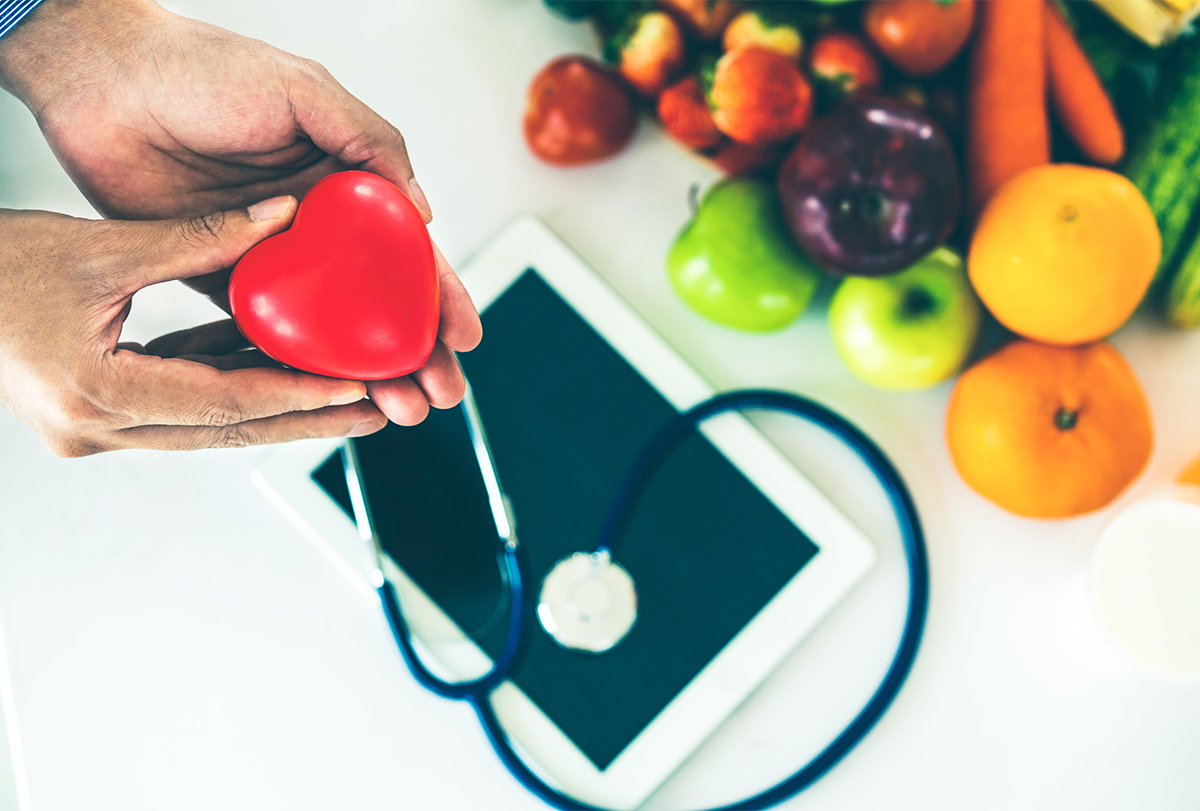
Unhealthy dietary habits and lack of physical activity can cause a significant rise in bad cholesterol levels in the blood, which is known as dyslipidemia, hypercholesterolemia, or hyperlipidemia.
Hypercholesterolemia is not only a predisposing factor to chronic ailments, such as cardiovascular ailments, strokes, hypertension, type 2 diabetes, and obesity, but it is also more common in those suffering from these preconditions. (1)
Types of Cholesterol
There are three types of blood cholesterol:
1. Low-density lipoprotein (LDL) or “bad cholesterol’’
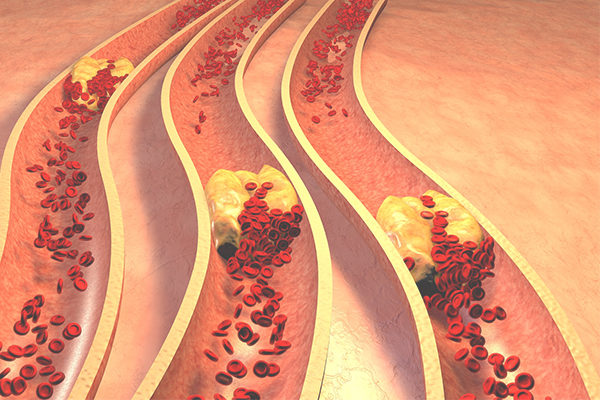
It is considered the harmful kind of cholesterol. (2) Excess LDL in the blood gets deposited on the internal walls of the arteries, shrinking the space for blood flow and triggering high blood pressure.
The reduced supply of oxygenated blood to the heart and brain can put you at an increased risk of a cardiac attack and brain stroke, respectively. (3)
Both these potentially fatal outcomes have emerged as the most prominent mortality causes in the United States, where one in three persons may suffer from a high cholesterol level. (3)
2. High-density lipoprotein (HDL) or “good cholesterol”
It helps counter the ill effects of LDL. Sufficient amounts of HDL can clean the arteries of bad cholesterol by delivering them to the liver from where they are discarded from the body.
3. Very-low-density lipoprotein (VLD)
It is a type of cholesterol that contains mostly triglycerides that contribute to heart ailments, including arterial blockages and strokes.
How Much Cholesterol Is Needed
According to the Centers for Disease Control and Prevention (CDC), a healthy lipid profile should fall within the following ranges: (4)
- Total cholesterol level below 200 mg/dL
- Total LDL level below 100 mg/dL
- Total HDL level 60 mg/dL or higher
- Triglycerides below 150 mg/dL
Experts suggest that switching to a vegetarian diet that is high in fruits, vegetables, nuts, beans, etc., may help counter high blood cholesterol levels. (5)
Foods That May Help Lower Your Cholesterol
Adopting healthy food choices is the first step toward managing your cholesterol levels. Here are some of the healthy food options.
1. Oatmeal
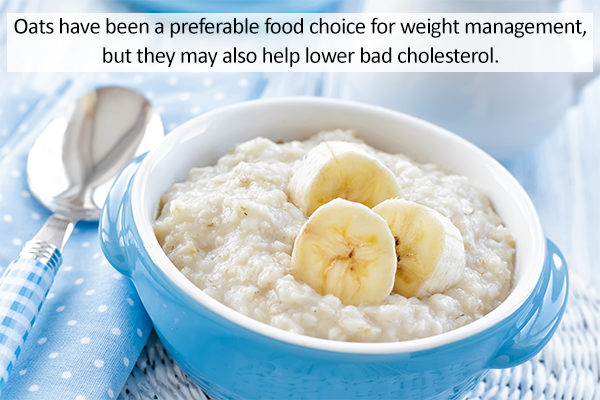
Oats have been a preferable choice for weight regulation, and they also have cholesterol-lowering effects.
The significant amount of dietary fiber found in oatmeal can help prevent the absorption of excessive amounts of LDL in the blood and thereby keep the total cholesterol levels within a healthy range. (6)(7)(8)
You can have a bowl of oats for breakfast or even use them to make a healthy variant of baked foods, smoothies, etc.
ALSO READ: 10 Reasons Why Oatmeal Is Good for You and How to Make It
2. Soybeans and soy products
Replacing animal-based protein in your diet with vegetarian proteins, such as soy, can help lower your intake of saturated fat.
Soy products, such as tofu, soy milk, edamame, and soy flour, are good sources of vitamins, minerals, and healthy fats, all of which can contribute to lowering the levels of bad cholesterol.
A 2015 meta-analysis attributed the LDL-inhibiting effects of soybean to the soy proteins and isoflavones found in it. Results showed that whole soy foods were more effective in this regard than soy supplements. (9)(10)(11)
ALSO READ: Soy: Nutrients, Health Benefits and Allergy Symptoms
3. Nuts
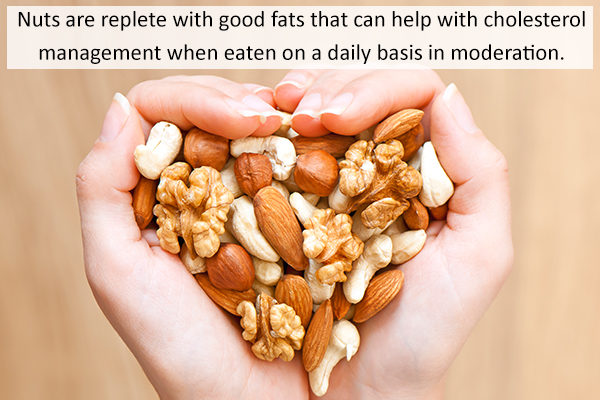
Unlike trans and saturated fats (which are some of the main instigators of hypercholesterolemia when eaten in excess), the unsaturated fats (good fats) found in nuts are known to reduce the risk of cardiovascular disease when taken in moderation and as part of a well-balanced diet.
Tree nuts, such as almonds, walnuts, pine nuts, macadamia nuts, hazelnuts, cashews, and pistachios, are all good source of:
- Polyunsaturated fatty acids (PUFA)
- Monounsaturated fatty acids (MUFA)
- Fiber
- Antioxidants
These compounds can collectively lower total cholesterol, LDL cholesterol, and triglyceride levels in the blood. (12)(13)(14)
Since nuts are quite filling, it is best to consume them between meals as a snack – a small handful – to curb your overall appetite.
4. Fruits and vegetables
It is important to limit your intake of meats and instead build your meal plan around fresh fruits and vegetables.
Not only are fruits and vegetables rich sources of dietary fiber, but they also contain antioxidants, polyphenols, flavonoids, vitamins, and minerals, which are considered good for your heart, cholesterol management, and overall health.
Some studies found that regular consumption of citrus can mitigate the risk of cardiovascular disease. (15)(16)
Even though avocados have a higher fat content than many other fruits, they mostly contain heart-healthy monounsaturated fats. Avocados are also a source of plant sterols, which can help lower cholesterol levels. (17)(18)
5. Fatty fish
Consuming fatty fishes, such as tuna, salmon, and mackerel can help in lowering your triglyceride levels. Because fatty fishes are high in heart-healthy fats, they may not lower your LDL serum concentration but can increase the amount of HDL in the blood. (19)(20)
Baking or boiling the fatty fish helps retain most of its nutritional value during the cooking process. Try to have two portions of fatty fish weighing 2–3 ounces every week.
People who do not want to eat fish can consider taking fish oil supplements but only after consulting their doctor about the proper dosage.
6. Green tea
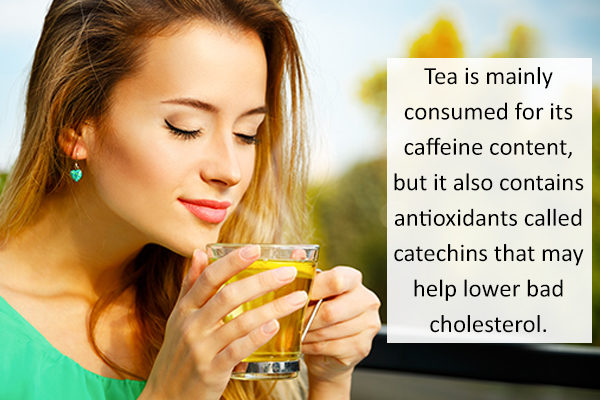
All tea leaves contain caffeine, which is a stimulant, and catechins, which are a type of antioxidant. While tea is mainly consumed for its caffeine content, it is the catechins that may help in lowering bad cholesterol. The fermentation process strips away the catechin content of teas and renders them less effective for combating high cholesterol levels and other health issues.
For this reason, green tea, which hardly undergoes any fermentation, is the most preferred choice for lowering cholesterol levels. Black tea, which is perhaps the most fermented of all teas, is not as helpful.
As healthful as it may be, green tea consumption alone cannot help bring down or manage cholesterol levels. It should be used as a complementary measure to standard treatment and as part of an overall healthy lifestyle and diet. (21)(22)
7. Olive oil
Olive oil can be a heart-healthy substitute for hydrogenated fats and animal-based fats. You can use olive oil in place of butter, margarine, and other regular cooking oils to whip up salad dressings and bread dips and to cook dishes.
Several varieties of olive oil are available. The oil tends to lose out on its inherent health potential when processed. Thus, a preferable variety is extra-virgin olive oil.
Having around 2 tablespoons of olive oil per day is unlikely to impact your HDL levels in a negative way, so it is a win-win. (23)(24)
Note: Do not overdo the amount of olive oil in your daily diet as it has high calories and may lead to undesirable weight gain. The recommended way to use olive oil is as a substitute for other fats already in your diet.
ALSO READ: Olive Oil: Nutrition, Types, Uses, and Benefits
8. Legumes
Legumes are a rich source of dietary fibers, especially viscous soluble fiber that facilitates the removal of excess cholesterol from the body. (25)(26)
Legumes, such as chickpeas, lima beans, kidney beans, and black-eyed beans, are also loaded with protein that serves as a healthier alternative to animal-based protein for people with hypercholesterolemia.
Unlike red meats and other similar animal-based products, legumes can fulfill your protein needs without adding to your caloric load and LDL cholesterol level.
9. Dark chocolate
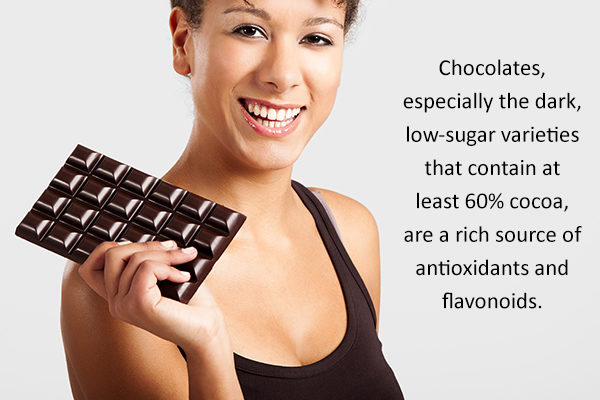
Chocolate, especially one that is dark and low sugar and is made up of at least 60% cocoa, is a rich source of antioxidants and flavonoids. These organic compounds can help improve blood health by mitigating oxidative damage to blood cells and preventing them from clumping together. (27)
A 2017 study found that consuming almonds with or without dark chocolate had a favorable impact on serum cholesterol levels. (28) Some studies also showed that, when taken in a calorie-regulated amount, dark chocolate, cocoa, and almonds improved cardiovascular health. (27)(28)
Note: For cholesterol regulation, it is better to have bitter chocolate that is sugar-free or contains a very small amount of sugar. Also, dark chocolate is only healthy when eaten in moderation, that is, no more than 1–2 ounces of dark chocolate per day.
ALSO READ: Is Dark Chocolate Good for Health? Explained by a Dietician
Additional Tips for Lowering Cholesterol Levels
Here are a few extra tips for regulating your cholesterol levels:
- Try to maintain optimal body weight.
- Give up cigarettes and other forms of smoking.
- Reduce your daily sodium intake to just 2,300 mg (or 1 teaspoon of salt).
- Exercise half an hour every day, and do so for at least 5 days a week if approved by your doctor.
- Alcoholism may be another reason for hypercholesterolemia. It is therefore recommended that you either stop alcohol consumption altogether or cut down its intake.
- Foods such as red meat, shrimp, liver, egg yolks, whole milk, and other non-vegetarian items are rich in cholesterol or saturated fat, and their frequent intake may aggravate your dyslipidemia. Therefore, it is better to skip them or have them in moderation and keep your cholesterol intake below 200 mg per day.
- Fried foods are high in saturated and/or trans fats and are primary contributors to raising your LDL levels. These foods should be avoided as much as possible.
- Form a diet plan that has low amounts of processed sugars and carbohydrates.
- Use heart-healthy unsaturated fats, especially those that are obtained from walnuts, almonds, or olive oil, in place of processed and hydrogenated fats such as butter or margarine.
- It might be a good idea to keep a log or journal that is exclusively meant to record your eating habits and preferences.
- For better and effective cholesterol management, seek professional help to understand the type of food, exercise, and dietary restrictions, you need to follow to bring down your LDL levels and increase your HDL levels.
Final Word
Given that unhealthy food choices can be a factor for high cholesterol levels, eating a heart-healthy, balanced diet is key for treatment and prevention.
The foods shortlisted in this article exhibit cholesterol-lowering effects that have been verified by preliminary research but need to be investigated more extensively in large-scale studies.
Besides, a single food item cannot make a significant difference unless incorporated in a wholesome, healthy diet and coupled with other lifestyle changes and medical treatments.
Despite their suggested benefits, these foods must be consumed in moderation as most of them are energy-dense and may hamper digestion if eaten in excess.
- Was this article helpful?
- YES, THANKS!NOT REALLY


